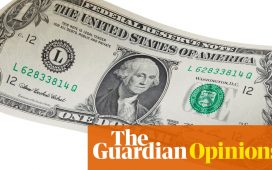US energy secretary Jennifer Granholm sought to ease clean energy trade tensions with the EU, saying the Biden administration was seeking to build supply chains with “countries whose values we share”.
The US and EU were in talks about a free trade-style deal around clean technology, she said, which could soothe European anxieties that the US’s $369bn in new subsidies for low-carbon energy would suck capital across the Atlantic.
“That’s one of the discussions that I know the administration is having,” Granholm told the Financial Times in an interview in Houston on Thursday. She added: “We don’t want to see any trade rivalry. And we’re in discussion with our EU counterparts about how to make sure we can do this in a way that lifts all.”
Granholm’s comments came hours after the EU relaxed state aid measures, allowing member states to match subsidies if there is a risk of investment being diverted from the bloc.
The US’s Inflation Reduction Act, passed last year, includes $369bn worth of tax credits, loans and grants designed to stimulate clean technology investment and meet President Joe Biden’s goal of halving US carbon emissions by 2030.
But the scale of subsidies has prompted fears of a new trade war, with President Emmanuel Macron of France warning that the IRA threatened to “fragment the west”.
Europeans have also been alarmed by what they perceive to be an aggressive push by US states to lure investment from the EU, including hefty subsidies for companies moving manufacturing to the country.
Last month, John Podesta, the Biden administration official in charge of implementing the IRA law, said in an interview with the FT that the US would make “no apologies” for prioritising American jobs as it tried to take control of global clean energy supply chains.
On Friday, Biden and Ursula von der Leyen, the European Commission president, are expected to discuss co-operation over the critical mineral supply chain at a White House meeting.
Granholm said the US was seeking to build a “backbone” of manufacturing to reverse decades of deindustrialisation and break dependence on China. But allies would not be excluded.
“We want to ‘friend-shore’ some of that — we want to have a supply chain that is robust with our allies and with countries whose values we share.
“This is another reason why we’re having those discussions with our allies to make sure that we are able to proceed apace and still build up that backbone.”
While the IRA has already brought an influx of projects and spending commitments, some clean tech developers have warned that the effort to eliminate China from supply chains will slow down deployment.
Solar installations in the US in 2022 fell for the first time since 2018 after investigations into tariff-dodging and seizures of products linked to forced labour in China curtailed the supply of modules.
China also dominates processing of lithium that will be needed as the US tries to electrify its transportation system with battery-powered cars. The US may still need to import lithium by 2030, Granholm conceded, “but not from China . . . at least the goal is not to do it”.
Additional reporting by Amanda Chu in New York
Climate Capital

Where climate change meets business, markets and politics. Explore the FT’s coverage here.
Are you curious about the FT’s environmental sustainability commitments? Find out more about our science-based targets here









